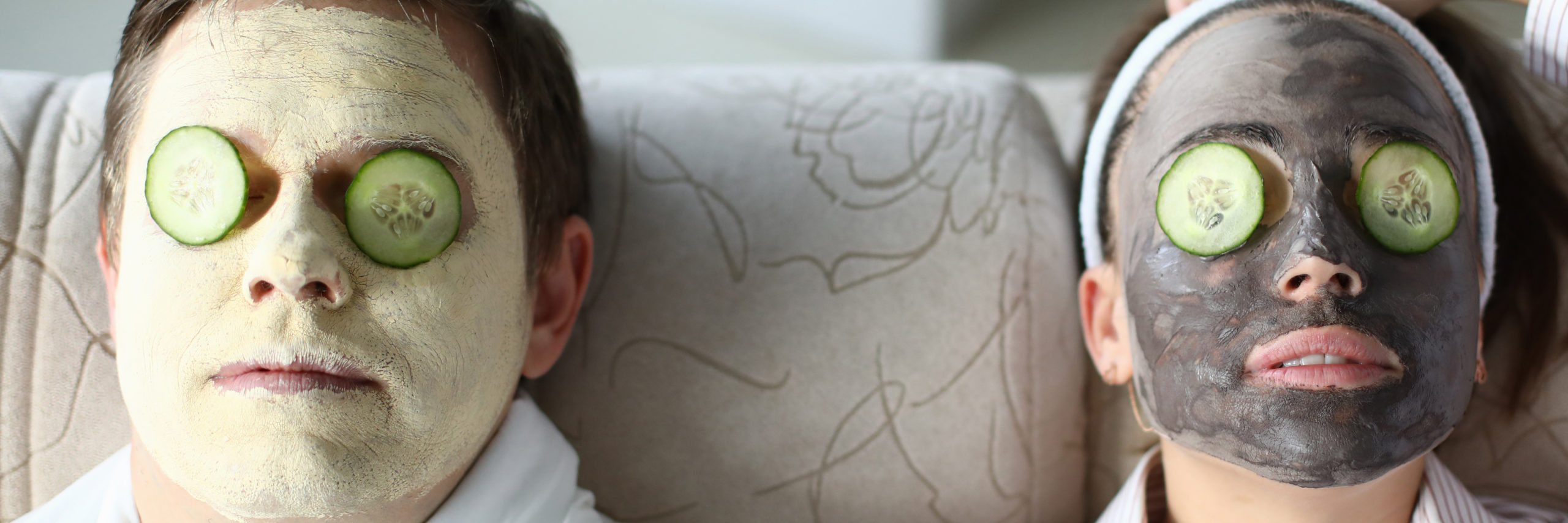
Causes of Stress
Loss of employment and loss of income.
Working from home and trying to balance productivity with home life.
Responsibilities and distractions including home schooling, child care.
Loss of social and physical connections created by social and physical distancing.
Increased conflicts and disruptions in normal relationships. Fitness programs interrupted, but some alternatives are online now.
Sleep impairment and deprivation causing exhaustion impacting self care routines.
Effects on circadian rhythms; increased stress hormones amplifying anxiety parallel to worsening of various skin conditions.
Changes in normal routines which include basic hygiene, nutrition, exercise, self-grooming (eg. makeup, nail & hair care) Which can create a negative self-image perception.
Skin Disorders
Contact Dermatitis of hands and face due to higher frequency of washing and use of excessively drying soaps and high-alcohol cleansers.
Contact Dermatitis around ears due to Rubber/Latex & Nickel containing staples used to make homemade masks.
Contact Dermatitis & contact Urticaria (and Anaphylaxis) of hands due to an up-surge in latex glove use as latex-free glove sources are drying up.
Atopic Dermatitis Flares due to excessive washing without adequate paring of needed moisturizing of the skin.
Acne Vulgaris flares due to stress, nutritional interruptions and disruptions to treatment protocols.
Acne Mechanica caused by wearing masks for long periods of time over.
Comedogenic skin care products and disruptions to daily cleansing regimen.
Rosacea, Psoriasis and more
Rosacea flares due to increased alcohol consumption (alcohol sales are up 200%).
Increased global redness of the skin and inflammatory papulopustules.
Psoriasis flares due to excess skin dryness from increased washing, increased stress, excess dietary influences from snacking of high carbohydrate and fatty foods and alcohol excesses plus influence of Koebner (Isomorphic) phenomenon associated with increased scratching of the skin.
Lichen Simplex Chronicus flares, a condition of itch-scratch-itch rash that is aggravated in settings of increased stress causing increased picking at the skin causing open sores and excoriations.
Urticaria occurs in 25% of individuals sometime in their lifetime. During times of stress, hives can flare acutely in an individual with a genetically pre-program med tendency. Usual treatments may or may not be as affective during times of added stress and anxiety.
Hair Loss Conditions
Hair loss conditions, including Telogen Effluvium can be triggered during times of major psychological stress or associated with high fever, severe Infection or other illnesses. Also, dietary disruptions and hormonal conditions such as thyroid disease can increase hair loss. In those affected, up to 30% of hairs stop growing and go into a rest phase in a diffuse pattern usually lasting 3-6 months.
Alopecia Areata, another hair loss condition, is autoimmune causing. It results in total loss of hair in areas of the scalp or any other area where hair normally grows. One theory of its cause is that it commonly occurs in a genetically predestined individual who experiences a source of intense stress such as: losing a job, someone of importance in one’s life dies, the end of a close relationship, or financial instability. This can be temporary or can last for years.
Nail changes include Beau’s Lines which are transverse grooves in the nail plate that can occur in 1-10 fingernail plates during an intense stress to ones Physical or Psychological health over the previous 6 months. This sign has been Referred to as a “Retrospective Indicator of a Pathological State” experienced In the body.
Treatment and Prevention
Work on stress management through yoga, meditation, exercise, and get closer to nature.
Identify those things that you have control over versus those things that are completely out of your control.
Get adequate sleep (8 hours) and be mindful of proper sleep hygiene as you are getting ready for bed.
Maintain regular routines and habits keeping up with daily skin care.
Moisturizing routines pared with the increased need for hand washing.
With the use of drying soaps and high alcohol cleansers (eg. Purell).
Diet considerations: Avoid excess alcohol, and foods high in fat and carbohydrates. People who are working at home or out of work are tempted to eat lots of snack foods due to nervous habit and having access to all of your groceries. Replace these foods with healthier choices, such as fruits and vegetables. Some great foods for your skin are salmon, green tea, watermelon, tomatoes, avocados, carrots, turmeric, yellow and green peppers, and so many more.
Stay hydrated by drinking lots of water….you will feel better.
Don’t confuse Social Distancing with Physical Distancing. In these times of pandemic and mandates of not being within 6 feet of others to lessen spread of the Covid-19 virus. People should be encouraged to connect virtually with people you love using screens and digital technology.
